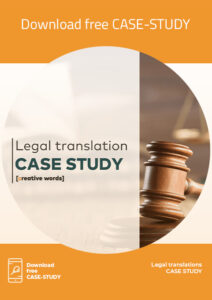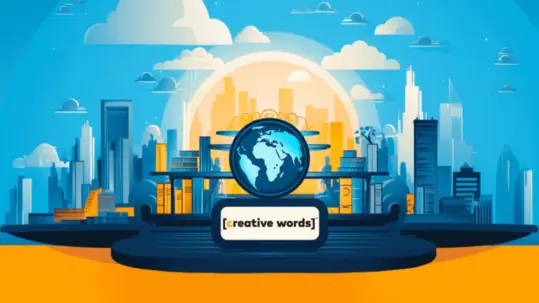
03 Feb Legalised translation: how to translate and legalise a document
In an increasingly international world, a legalised translation of personal documents can be necessary in several cases. But what do we mean when we say legalised translation? What is it really for, and how is a translation actually legalised?
When it comes to legalised translation, there is a mistaken tendency to think that this concept embraces all translations of legal documents without distinction, regardless of the use and destination of the document.
 In reality, however, the process of legalising a translation is quite complex: given the importance of the subject, it is thus always necessary to rely on professionals who can guarantee maximum transparency and a result that is faithful to the original.
In reality, however, the process of legalising a translation is quite complex: given the importance of the subject, it is thus always necessary to rely on professionals who can guarantee maximum transparency and a result that is faithful to the original.
If you would like to find out how Creative Words has dealt with translation in the legal-financial field, download our case study for free.
If you simply want to learn more about the concept of legalised translation, continue reading our article.
Of course, let’s start with the basics.
What does legalised translation even mean?
In general, simplifying, we can say that a legalised translation aims to legalise – that is, make a foreign document legal in another country.
Be careful not to get confused: legalising and swearing a translation are two different things, the difference of which we will return to in a moment.
In principle, meanwhile, we can say that a legalised translation produces a document or certificate that has the exact same legal value as the source document in the destination country.
Therefore, a legalised translation of a birth certificate or degree will not only indicate that the data given are correct and faithfully translated, but also that the original document from which these are taken is indeed an existing and legally valid certificate.
Legal, sworn and legalised translation
As we have already mentioned, the concept of legalised translation is often mistakenly confused with that of legal and certified or sworn translation. But what are the differences?
A legal translation is simply a translation of a legal text into another language. No specific operations, approvals or legal certifications are needed: like any other text in another language, the translation is finished once it’s complete.
Legal translations include translations of law manuals, court rulings, and more. The final document has no legal value: indeed, it is simply a translation.
When we speak of sworn translation, we are instead referring to the process of certifying a translation: in essence, through the certification, the translator swears (certifies) before a court that they have faithfully translated the source text.
In Italian law, the various documents to be certified must be accompanied by 16-euro revenue stamps to certify their validity. Once the translation has been sworn, it is entered into the register of sworn expert reports, becoming an official translation for all intents and purposes. Of course, the translator who carried out the certification assumes all responsibility for any misunderstandings and translation errors.
Certified translation is often used for driver’s licences, medical documents, foreign birth certificates and more.
However, this process has a limitation: in fact, it only certifies the reliability of the translated document, without any verification of the authenticity or content of the original document – or, of course, of the translation.
This is where legalised translation comes in, a process of ascertaining and validating the translated document so that it has full legal validity in the target country.
How to legalise a translation
Before we delve into the process of legalising a legalised translation, we must claify that in order to legalise the source document, the client must personally go to the prefecture in his or her country, or to the consulate if it is already a foreign document.
Once the source text has been legalised, the translator can then start working on the translation and proceed with its legalisation when finished.
 Having come to this point, a further important distinction must be made: in 1961, more than 100 states signed the Hague Convention, an agreement to simplify the legalisation of foreign documents.
Having come to this point, a further important distinction must be made: in 1961, more than 100 states signed the Hague Convention, an agreement to simplify the legalisation of foreign documents.
If the document is to be legalised for a country under the Hague Convention, simply contact the authority in each state to request an apostille be affixed to the translation. This certification is automatically recognised by both the destination country and the country of origin, attesting to the legal and juridical validity of the document.
If, on the other hand, a legalised translation is needed for a country that is not under the Hague Convention, it will be necessary to contact consular authorities.
In general, therefore, we can conclude that while a sworn translation certifies the fidelity of the translation to the original document, a legalised translation serves primarily to ensure the validity of the original document and authority.
When a legalised translation is required
A legalised translation may be necessary, for example, for enrolment in foreign university courses: in this case, the destination university may wish to ascertain the validity of previously earned degrees in order to complete registration.
Legalised translations are also often necessary when marrying abroad: indeed, the destination municipality may want to ensure the authenticity of the foreign spouse’s birth certificate.
It should also be added that before legalising a translation it is very often first necessary to notarise it. In essence, then, the client must see to the legalisation of the source document, if required, while the translator or translation agency will translate the document, have the translation notarised, and then legalise it, in that order.
Therefore, a legalised translation is the end of a long and complex process. Of course, it is necessary to rely on legal translation professionals who will be able to ensure maximum transparency and speed during the process, independently providing sworn affidavits and legalisation and promptly notifying the client of any problems.
If you need a legalised or sworn translation, contact us without any obligations: we will be happy to work out a free quote and study the solution that best suits your needs.





